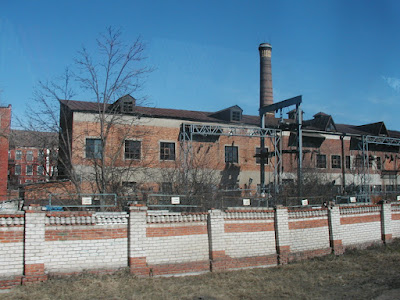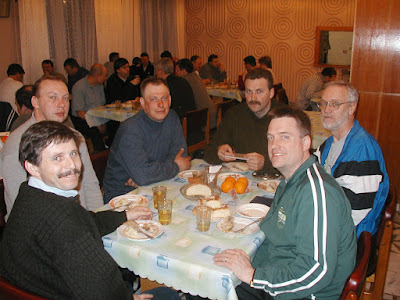One would not be surprised to find angels in cemeteries, carved into the faces of grave markers or perched atop a stone pillar. That and the presence of crosses on Orthodox Churches everywhere in Russia did not prepare me for the angels we found at war memorials. Americans commonly employ angels at war memorials in our country, too, but seeing them in Russia cast them in a new light. It allowed me to see them in a new way.
This imposing angel-topped obelisk honoring fallen soldiers stands at a large memorial installation in Moscow; it is dedicated to the many who died during WWII. Russia has suffered greatly and for many centuries from various wars, invasions, the constant need to defend. The figure at the base of this obelisk is St. George slaying the dragon. St. George and the story of his slaying the dragon holds a long and honored place in the Russian narrative.
This white memorial with three kneeling angels, as I understand it, had been very recently built when we visited during one of our tours of Vladimir. It was one of several we stopped to see.
One also finds angels in places and contexts. I might have thought these strange before I encountered them. While we lived in North London, for example, we frequently shopped near "the Angel," identified physically with these silver wings.
Some years after I took this photograph, I came across a reference to "the Angel" in Islington, North London, in Oliver Twist, the Charles Dickens novel. Dickens's reference predates the erection of these wings and he would not recognize "the Angel" were he to return for a visit.
Still, it was a joy for us to live there and discover this treasure, which like the memorials in Russia signify a deep and complex history of human activity. I am grateful for these opportunities and experiences.
Somewhere in the last few decades Donna has begun collecting angels of a smaller variety for display during the Advent season. These, crafted of a variety of materials, tell different stories, display degrees of formality, and, as one would expect, demonstrate a range of artistic vision. They also offer us different ways of thinking about the role of angels, seen and unseen, in our lives.
I do have favorites among these angels, of course. I am very fond of this hand-carved and hand-painted angel from the nativity set carved by our Russian translator and my friend, Andrew. This strong personal connection to Andrew is also a strong connection to the faith community in Russia, to the Russian "folk" culture, and to the Biblical narrative we re-imagine and celebrate at Christmas.
Angels have served many functions, of course; they are not confined to Christian holy days. In our own family life, Donna and I have experienced the presence of angels. Those experiences deserve their own story on another occasion; their reality, though unseen, is tangible for us.
Apart from that, we know that however much we are attracted to its "weight" angel figures can be misused in ways that make them superficial. Or in ways that attach them to deeply meaningful, deeply disturbing events or beliefs or circumstances. A careful look at the angel with the trumpet in the first photo will show that the obelisk takes the shape of a bayonet, which is attached at bottom to the muzzle of a rifle. For me at least, that coupling of angels to the bloody end of a weapon of war is hard to resolve.
Nevertheless, in this Easter season, I come back to our Christmas angel collection. My favorite is a seated angel. Like its counterparts at the war memorials in Russia this one, too, is a cemetery angel, where it appears as a sign of hope for the dead.
Unlike the other angels, however, I imagine this one to be seated at Jesus' tomb. In Mark's account of Easter morning, he greets the women who have come to anoint his body. "Do not be alarmed," the angel tells them. "You seek Jesus who was crucified. He is not here. He has risen."
The angels we find in cemeteries signify our hope of resurrection. The angel at Jesus tomb testifies that resurrection is an accomplished fact.




















